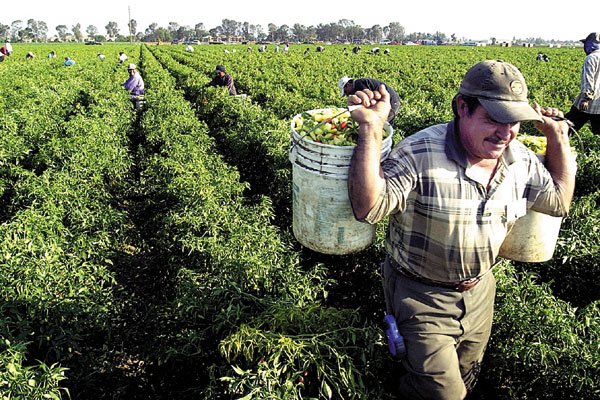Community unsure, but farmers see potential to replace current
farmworker program
Gilroy – Federal immigration legislation that fueled nationwide protests this week is getting mixed reviews from South County’s immigrant community, but local farmers see in it the seeds of a solution to their labor problems.
A batch of competing immigration reform bills are circulating around Capitol Hill with various provisions to create guestworker programs, a possible amnesty for immigrants who pay a fine and pass a criminal background check, and tighter border controls. The most controversial idea, to make it a felony to provide any form of assistance to an illegal immigrant, was passed in the House but is currently not being considered by the Senate.
David, an illegal immigrant who works for a painting contractor and in other construction jobs, said through an interpreter, that some of the proposals sound promising, but he’s looking for more information.
“It sounds good, but I would like to know more about it,” David said. “These are questions I would like to understand more before I answer them.”
The vast majority of California’s more than 500,000 farmworkers are from Mexico and other Hispanic countries. In a speech on the Senate floor Thursday, California Democratic Senator Dianne Feinstein said half of them are illegal immigrants.
In recent years as federal authorities and a vigilante group called The Minutemen have cracked down on the Mexican border, farmers in the state have faced a labor shortage.
Immigrants say they come here for jobs, and the state’s employers, particularly farmers, depend on their labor. Feinstein’s proposal would allow farmworkers already in the country to eventually get a green card, which would allow their spouses to work and for immigrants to keep their families together.
“The result is that American agriculture would have a stable base of employment which is legal, which has the opportunity to bring people out of the shadows into the bright light of day, assume additional responsibilities, grow in the process, and raise their families,” Feinstein said.
Peter Aiello, of Uesugi Farms, called the legislative proposals an exciting first step toward replacing the country’s current farmworker program that the state’s farmers consider useless. Uesugi uses as many as 500 migrant workers in the summer.
“There’s a lot of work to be done and a lot of lobbying to be done, but this is rather encouraging,” Aiello said of a proposal to create as many as 400,000 guest worker visas for agriculture. “It would be a much less cumbersome process than we have now. I don’t know a single farmer that uses the H-2A process.”
The bills worry immigrants because a new guest worker program without an amnesty would make it impossible for illegal immigrants to live and work in the open. Current law requires undocumented foreigners to be deported for as long as 10 years. Much of the competing legislation is far less forgiving then the package Feinstein helped shepherd through the Senate Judiciary Committee this week.
“I didn’t know what I would do,” said Lulu.
Lulu’s husband has a green card, but she has been in the country illegally for 13 years. She said she would support a tighter border if there was also an amnesty or some other way that would allow her to stay, but she doesn’t think border control will stop immigrants.
“People wouldn’t stop,” she said. “This is a dream in Mexico.”
Local immigrants legal and illegal said they see the value of new laws because if foreign workers are legalized they will be far less open to exploitation from criminals, unscrupulous employers and human smugglers, known as coyotes, who are often violent and take large sums of money to help people cross the border.
David, 22, crossed the border eight years ago and had to pay a coyote $1,200. He’s doesn’t know if he wants to be a U.S. citizen, but he would like to be able to cross the border easily so he can visit his homeland. David, who’s been home just once in eight years, said he may prefer a processing fee for a temporary visa to a dangerous and expensive illegal crossing.
“I definitely would like to go back more,” he said. “It’s very easy to return, but it’s very difficult to come back.”
Some immigrants believe that the U.S. should do nothing but make it easy for foreign workers to live in the U.S. Victor, who came to the U.S. illegally in 1980 but now has residency papers, doesn’t approve of any program that allows only temporary residence, and is appalled by calls for a fence to be built along the border.
“People should be able to come in and apply for citizenship and work,” Victor said. “I would like people to be able to come through a door and not over a fence.”
Immigration Q & A
How can foreign workers enter the country legally?
– The U.S. issues a number of temporary work visas, typically for people with special skills in technology or medicine, though fashion models and Olympic ice skaters qualify as well.
– There is a special visa for farm workers, called H-2A, but California farmers say the program doesn’t work and is little used.
– Foreign citizens with relatives who are U.S. citizens can petition for entry, provided the petitioner has not been caught in U.S. illegally. Spouses and children of citizens are eligible immediately, but some, such as siblings, may have to wait as long as 12 years to enter the country.
How do illegal foreign workers become citizens?
– They don’t. Changes in immigration law over the last decade make it impossible for people in the country illegally to gain permanent residence or citizenship.
– Even foreign nationals who marry a U.S. citizen must return to their native country before they can re-enter this country and achieve permanent status. Aliens who have been in the country more than six months are barred from re-entry for three years. Aliens here longer than a year are barred for 10 years.
Source: U.S. Citizenship and Immigration Services
Editor’s Note:To protect the identities of immigrants who may not have proper documentation to live and work in the U.S., the Dispatch is using only the first names of all immigrants in this story.














